Brent Scowcroft, 1925-2020
The National Security Advisor to Presidents Ford and GHW Bush has died.
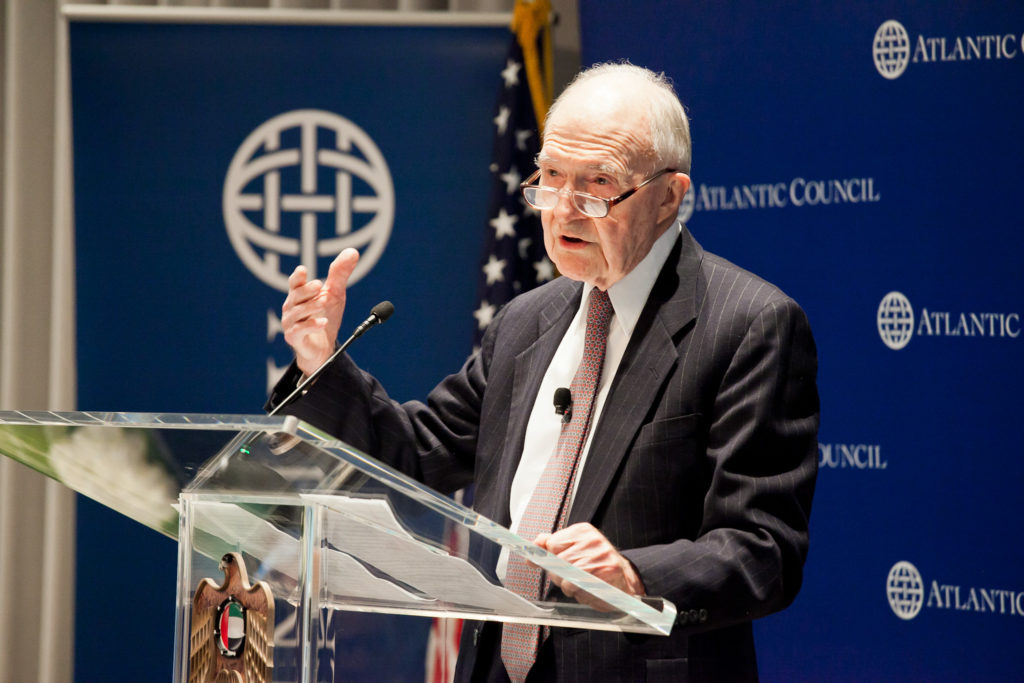
Lieutenant General Brent Scowcroft, the soft-spoken intellectual giant who is universally viewed as the archetype of what a National Security Advisor should be, has passed.
I’m not seeing news accounts but many well-placed people on Twitter are sharing the sad news.
I had the pleasure of meeting him and speaking with him on numerous occasions while I was at the Atlantic Council, where he twice served as Chairman and long served on the board of directors. I had the privilege of being there the night we inaugurated the Brent Scowcroft Center for International Security (since renamed the Scowcroft Center for Strategy and Security).
He was perhaps the last great man to hold the NSC post and, indeed, the last great statesman to represent the United States. His leadership, along with that of President George H.W. Bush, in managing the end of the Cold War was the epitome of diplomacy, handling with class and foresight what could well have been a catastrophe.
We’ll likely not see his kind again.
Rest in peace, General.
UPDATE: The (presumably pre-written) obituaries are pouring in. I’ve highlighted some of the most prominent.
New York Times (“Brent Scowcroft, a Force on Foreign Policy for 40 Years, Dies at 95“):
Brent Scowcroft, a pre-eminent foreign policy expert who helped shape America’s international and strategic decisions for decades as the national security adviser to Presidents Gerald R. Ford and George Bush and as a counselor to seven administrations, died on Thursday at his home in Falls Church, Va. He was 95.
His death was announced by a family spokesman, Jim McGrath, who did not cite a specific cause.
Mr. Scowcroft wanted to be a fighter pilot after World War II, but a plane crash changed the young man’s life and, as it turned out, gave the nation one of its most authoritative military intellectuals — a diplomat, linguist, tactician on nuclear arms and missile systems and a scholar of global politics who became an influential voice in Washington for more than 40 years.
He accompanied President Richard M. Nixon to China in 1972, oversaw the Ford administration’s evacuation of Americans from Saigon in 1975, laid groundwork for President Jimmy Carter’s Strategic Arms Limitation Treaty with the Soviet Union in 1979, evaluated the MX missile systems for President Ronald Reagan in the 1980s and directed President Bush’s strategy in the Persian Gulf war in 1991.
Mr. Scowcroft was a principal architect of American policy toward post-communist Russia, a leading Republican voice opposing the American-led invasion of Iraq after the Sept. 11 terrorist attacks and a voice in President Barack Obama’s selection of a national security team after the 2008 elections.
He also wrote books, taught at universities and counted among his many protégés Condoleezza Rice and Robert M. Gates, both national security experts who became secretaries of state and defense for President George W. Bush.
Washington Post (“Brent Scowcroft, national security adviser to two presidents, dies at 95“):
Retired Air Force Lt. Gen. Brent Scowcroft, who served at the right hand of power as national security adviser for presidents Gerald R. Ford and George H.W. Bush and played instrumental roles in shaping nuclear warfare strategy, dealing with the end of the Cold War and restoring relations with China after the Tiananmen Square massacre, died Aug. 6 at age 95.
[…]
Gen. Scowcroft did not command the public recognition of Alexander M. Haig Jr., whom he replaced as deputy national security adviser in 1973, or Henry A. Kissinger, whom he succeeded as national security adviser in 1975. Nor did Gen. Scowcroft draw or encourage the media attention (and scrutiny) that made household names of those he closely mentored, including future secretaries of state Colin L. Powell and Condoleezza Rice and national security adviser Stephen Hadley.
Austere in his personal habits and utterly averse to publicity, Gen. Scowcroft kept his focus on discretion and private counsel, leaving him willingly overshadowed by more flamboyant personalities in the military and political establishment. His strength came from resolving interagency turf battles and exerting policy influence during an era when the Soviet Union was collapsing and China rising.
“I don’t have a quick, innovative mind,” Gen. Scowcroft once told Time magazine. “I don’t automatically think of good new ideas. What I do is pick out good ideas from bad ideas.”
Gen. Scowcroft fully came into his own as a strategic coach when President George H.W. Bush tapped him in 1989 as assistant to the president for national security affairs. In that job, he helped call the tactical plays for Secretary of State James A. Baker III and Defense Secretary Richard B. Cheney as part of Bush’s policy of caution and moderation concerning the fall of the Soviet empire.
That strategy drew strong criticism from hard-liners in Congress and anti-Communists who said Bush should have been a triumphalist and taken credit for the fall of the Soviet Union. Bush feared a backlash that might have forced Soviet leader Mikhail Gorbachev from power with a military takeover, and thus sought to avoid weakening Gorbachev further.
In their jointly written 1998 memoir of their White House years together, “A World Transformed,” Gen. Scowcroft and Bush made the case that by not humiliating Gorbachev, but supporting him, the president made it possible for Moscow to withdraw its forces from Eastern Europe and bring a reunified Germany into NATO. It was a feat that most European participants believed impossible.
Associated Press (“Ford, Bush presidential adviser Brent Scowcroft dies at 95“):
Brent Scowcroft, who played a prominent role in American foreign policy as national security adviser to Presidents Gerald Ford and George H.W. Bush and was a Republican voice against the 2003 invasion of Iraq, has died. He was 95.
Scowcroft died Thursday of natural causes at his home in Falls Church, Virginia, Bush spokesperson Jim McGrath said.
Scowcroft was the only person to serve as national security adviser to two different administrations. His appointment by Ford in 1975 came as Scowcroft retired from the Air Force with the rank of lieutenant general. He advised Bush, by then a close friend, during the four years of the Bush administration, 1989-93.
In a study of Scowcroft’s career, historian David F. Schmitz noted that Scowcroft had been at the center of numerous post-Vietnam War discussions of American foreign policy. He was part of the presidential administrations that grappled with U.S. responses to the collapse of communism in Europe, the crackdown in China after the Tiananmen Square protests, and Saddam Hussein’s invasion of Kuwait and the subsequent Gulf War.
“The key tenets of his thinking, shaped by the Second World War, were that national security policy had to protect the nation from aggression, provide international stability, control arms while maintaining preparedness, and shape an international environment that was conducive to America’s goals and needs,” Schmitz wrote.
Described as both gentle and tough, a brilliant coordinator most concerned with results, a tireless worker used to 18-hour days, Scowcroft offered a self-assessment to The Washington Post on the eve of the George H.W. Bush administration: “I don’t have a quick, innovative mind. I don’t automatically think of good, new ideas. What I do better is pick out good ideas from bad ideas. … It is comforting to be doing things that make a difference. In the end, it’s the job that’s more important.”

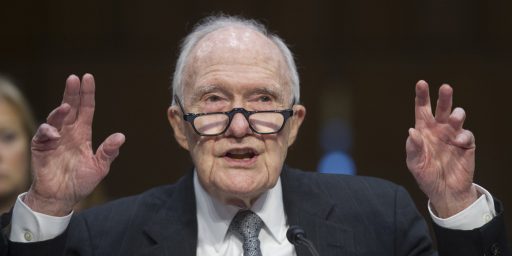
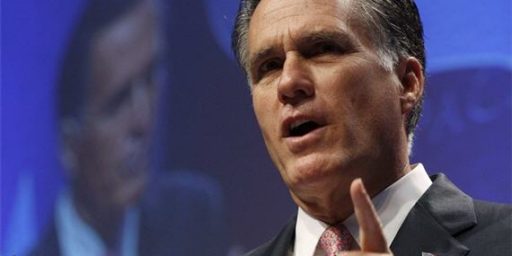
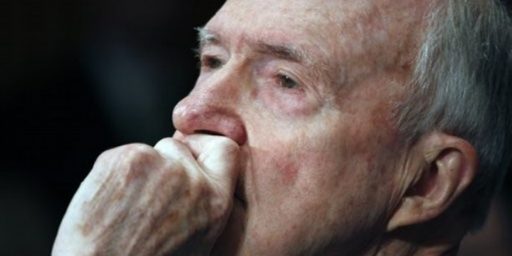
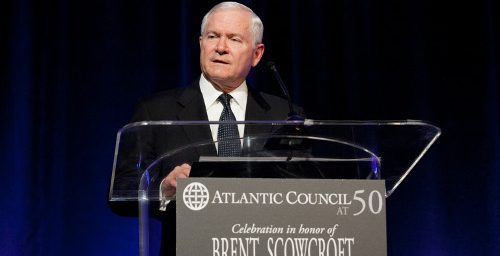

Scowcroft first time becoming National Security saw him replace Henry Kissinger. For a little over two years, Kissinger was holding down both NSA and Sec. of State. I doubt we will ever see that again.
RIP General.
@Bill: The job has gotten too big. And many insiders say that Scowcroft was the de facto National Security Advisor for Nixon toward the end.
Donald Trump: “Who’s that?”
You think I’m kidding?
On second thought, Trump may well know who Scowcroft is. Scowcroft endorsed–glowingly–Hillary Clinton in 2016. That will make Scowcroft Trump’s enemy in perpetuity.
@James Joyner:
James,
I think Henry Kissinger and maybe Seymour Hersch would seriously disagree with that statement.
I’m re-reading Kissinger’s three volumes of White House memoirs. Right now I’m only up to late 1972.
@CSK: Which is why he will respond “Scowcroft? don’t know him” if asked.
@Bill: He didn’t become Secretary of State until September 23, 1973. Scowcroft officially took the helm as National Security Advisor on November 3, 1975. But I’ve heard many say that Scowcroft was doing the job toward the end of Nixon’s tenure. Which makes sense, given that Kissinger was likely at Foggy Bottom.
@Just nutha ignint cracker:
Well, I’d be inclined to say it’s a toss-up there. He might disavow all acquaintance with Scowcroft, but I think that knowing that Scowcroft endorsed Hillary Clinton would enrage him to the point where he’d have to trash Scowcroft. You know that Trump has to seek vengeance against all his enemies.
@CSK: I don’t follow what Trump actually says about various people, so I have trouble imagining what he would say that would allow him to acknowledge that he knows how famous (compared to a rando carnival barker that is) Scowcroft is and still let him vent about a Hillary supporter. Easiest road for showing contempt is saying that he doesn’t know the guy. At least that what makes sense to me.
@Just nutha ignint cracker:
Trump generally says he doesn’t know someone when he wants to distance himself from a criminal or other undesirable–anyone, really, who would put Trump in a bad light. Remember: Trump didn’t know Jeffrey Epstein. He didn’t know Lev Parnas. He didn’t know half the women he sexually assaulted.
I know you meant it as the ultimate compliment but the thought just makes me depressed. We so need quiet, highly competent patriotic people again in government
@Scott:
Yes, and I think we’ll have those from time to time.
But, first, being a Scowcroft requires a rare combination of talent, force of personality, and humility. That’s hard.
More problematically, though, is that a Scowcroft likely can’t exist in a hyper-partisan environment such as we’ve had almost literally since he left office. If the assumption is that the administration is making foreign policy in the best interests of the nation—but that Congress nonetheless has a Constitutional role—it’s possible to be an impartial arbiter. If, on the other hand, it’s a partisan point-scoring fest, then you really need someone who can do sharp elbows on the Sunday shows.